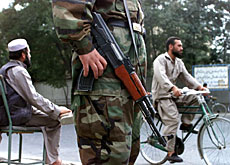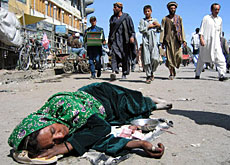Security expert warns of chaos in Afghanistan

A leading Swiss security expert says United Nations peacekeepers are out of their depth in post-war Afghanistan.
Albert Stahel, who has just returned from a fact-finding mission to Kabul, is calling on the UN to hand over control to the Afghan people.
Stahel told swissinfo that war was still raging in the country almost two years after United States-led forces overthrew the Taliban regime.
He said a series of wrong decisions had been taken and that a change in policy was urgently needed to bring stability to Afghanistan.
“The Afghans are becoming increasingly angry with the foreigners because the Americans are still fighting a war,” warned Stahel, who is a political scientist and military strategist at the University of Zurich.
“If Washington’s policy does not change, the country will sink deeper step by step. It is impossible for us to solve the situation.”
“But if the Afghans themselves have the opportunity to control the country, there is certainly a future because they are intelligent people and they certainly want to rebuild their country.”
Ceding control
Stahel said the absence of security both in and outside the capital remained a particular concern, with only a small part of the country controlled by the interim government.
Non-governmental organisations and peacekeeping forces have recently been the targets of a series of attacks blamed on local warlords and Taliban fighters.
An aid worker with the International Red Cross (ICRC) was shot dead by gunmen in March, and last week four German soldiers were killed in a suicide car bomb attack in Kabul.
However, Stahel said he did not believe local warlords were to blame for these attacks and he rejected claims that they have been causing havoc in some parts of Afghanistan.
“There is a lot of talk about warlords and in my opinion that’s wrong. There may be some commanders who are not satisfied with the government and, of course, with the foreign soldiers, but that’s all,” he said.
“I know many local commanders and you can cooperate with them; that’s not a problem. I think the Americans should stop waging their private war around the country and let the Afghans look after their own problems.”
Out of touch
Stahel claimed that a further problem was the isolation of soldiers of the UN International Security Assistance Force (ISAF) who are living in heavily guarded barracks, cut off from the local population.
“You have the feeling that these people are operating in a territory which belongs to the enemy. I think the barrack system is the wrong system.”
This was a fact confirmed by Major Ralph Ganter, one of the two Swiss members of ISAF who is stationed in a camp outside Kabul, in an interview with swissinfo.
“We have no real contact with the local population. We stick to life in the camp and we only go into the city when we are on patrol,” he said.
Stahel added that the Afghan government was practically bankrupt, further aggravating the security situation in the country.
“The soldiers have not been paid for six months, which means they are desperately looking for money and do robberies,” he said.
swissinfo, Billi Bierling and Ramsey Zarifeh
In December, 2001, US-led forces overthrew Afghanistan’s Taliban regime.
Afghanistan is being governed by an interim administration, which was chosen at a Loya Jerga – or traditional assembly of tribal representatives – in June 2002.
Hamid Karzai is the interim president of Afghanistan.
Afghanistan has a population of 24 million people.

In compliance with the JTI standards
More: SWI swissinfo.ch certified by the Journalism Trust Initiative

You can find an overview of ongoing debates with our journalists here. Please join us!
If you want to start a conversation about a topic raised in this article or want to report factual errors, email us at english@swissinfo.ch.